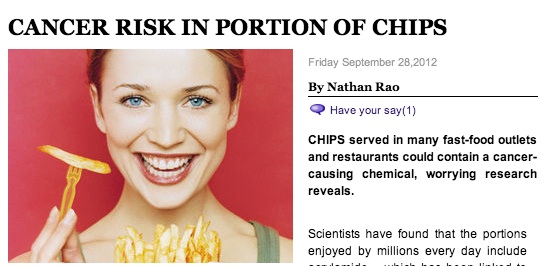Daily Express says chips give you cancer, fatso (maybe)
 SALT? Vinegar? Cancer? The Daily Express leads with “CANCER IN YOUR CHIPS”.
SALT? Vinegar? Cancer? The Daily Express leads with “CANCER IN YOUR CHIPS”.
Nathan Rao tells Express readers:
CHIPS served in many fast-food outlets and restaurants could contain a cancer-causing chemical, worrying research reveals.
The picture used to illustrate Rao’s refried news is of a woman smiling broadle as she holds up a chip on a spear, doubtless relived and elated to have snared the quarry before it could infect anyone with cancer (see left).
Scientists have found that the portions enjoyed by millions every day include acrylamide – which has been linked to cancer because of the cooking process.
Pretty much everything has been linked to cancer at some point.
The Food Standards Agency notes:
Given the uncertainties in exposure and the possible exposure to sources other than food, scientists have concluded that it is not possible to draw any definitive conclusions about the cancer risks of acrylamide in food…There are currently no regulatory maximum limits for acrylamide in food.
FoodDrinkEurope (which represents the food and drink industry’s interests at the European and international level), has produced a guide.
Rao writes:
The latest study, by researchers at Reading University, found acrylamide is present in chips which have been dried, frozen and cooked twice before reaching the table – a common form of preparation.
That’s the latest study? In 2009, FoodDrinkEurope looked at Acrylamide in potato products. It advised on “Methods of Reduction for finished French Fries”.
Acrylamide is a carcinogen. It is present in a wide range of foods such as biscuits, breads, crisps and chips that have been baked, fried or grilled at temperatures higher than 120C.
Yep. It says so on those official websites.
But in the wake of the new report it has sparked warnings for restaurants not to over-cook chips as the substance has been detected in potatoes and starch-rich foods which have been heated for long periods.
Warnings? No. It’s advice. FoodDrinkEurope advised in 2009:
Tools to try
• Control the levels of reducing sugars
• Blanch potato strips in hot water for a
longer period of time to remove
reducing sugars and control colour.
• Control the temperature & time of final
cooking
• Aim for a lighter golden colour when cooking
In 2011, FoodDrinkEurope had more advice:
Controlling reducing sugar is currently the primary measure employed by the industry to reduce AA levels in crisps and French fries
Rao says:
The report, published in the Journal of Agricultural and Food Chemistry, urges the food industry to modify how it prepares potatoes for sale to restaurants and takeaways.
None of this is new.
Food chemist Professor Donald Mottram, who carried out the research, said: “There is continuing concern about acrylamide, but this research highlights what we can do to reduce the presence in potato products. There is prior treatment of potatoes which can reduce the levels and the food industry will be alerted to these findings.”
Yep. FoodDrinkEurope has lots of tips from 2011. Such as:
Selection of potato varieties with low reducing sugars that are suitable for
the product type.
Minimising the risk of high reducing sugars by growing those low sugar
varieties best suited to the local growing conditions, by appropriate field
selection, and by adherence to agronomy best practice.
Ensuring tubers are mature at time of harvesting (immature tubers tend to
have higher reducing sugar levels).
Selecting lots based on reducing sugars content (crisp industry) or colour
assessment of a fried sample (crisp industry/French fry industry) – good
correlation between reducing sugars content and colour.
Controlling storage conditions from farm to factory (e.g. temp. >6°C
identified as good practice for long term storage, use of sprout
suppressants such as chlorpropham (CIPC) in accordance with the law
and with GAP, reconditioning at higher temperature. (e.g. ambient) over a
period of a few weeks).
Storing crops within the recommended window for the specific variety.
Why does Rao present all this old news as new news worthy of a front page?
Why does he want to scare his readers with:
Carcinogens in potatoes have been linked to an increased risk of cancer, specifically breast cancer, endometrial cancer and cancer of the womb.
And if the acrylamide doesn’t give you cancer, Rao has a back up plan:
Henry Scowcroft, at Cancer Research UK, said although the study showed increased levels of acrylamide, it was unlikely there was a serious health risk. He said: “It’s worth pointing out that chips are generally a high-fat food. Being overweight or obese does increase your risk of several cancers, so although we shouldn’t worry about the acrylamide in them, it’s better to be frugal with the French fries.”
So. About that headline…
Posted: 28th, September 2012 | In: The Consumer Comment | TrackBack | Permalink



